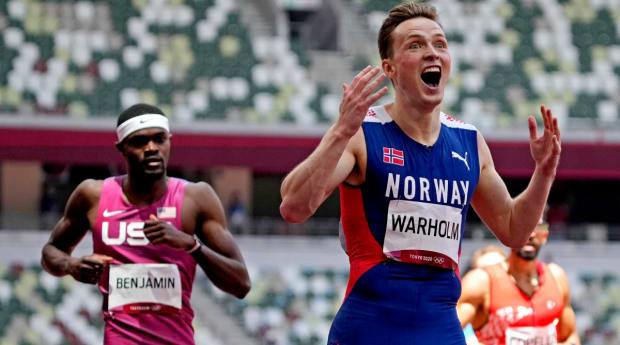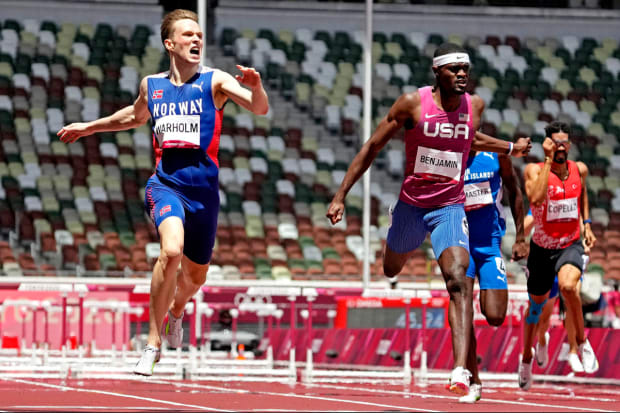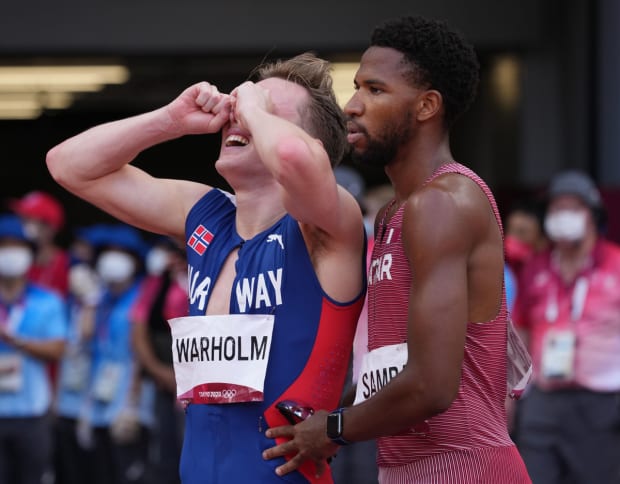In one of track's great individual rivalries, the 400-meter hurdles race certainly lived up to expectations.
Sign up for our free daily Olympics newsletter: Very Olympic Today. You'll catch up on the top stories, smaller events, things you may have missed while you were sleeping and links to the best writing from SI’s reporters on the ground in Tokyo.
TOKYO — Ten hurdles and one man stood between Rai Benjamin and his dream. There were other runners in the race, of course, but ultimately, that’s all they really were: Other runners. Norway’s Karsten Warholm, who broke a 29-year-old world record in Oslo last month, was in Lane 6. Benjamin was in Lane 5. On this day, in the damp heat of an empty Olympic Stadium, Benjamin would run the 400-meter hurdles faster than even the great Warholm ever had. And he would lose.
Warholm’s world record was 46.7.
Benjamin ran an astounding 46.17.
But Warholm ran a 45.94.
And so Benjamin cried.
“If you would have told me that I was gonna run 46.1 and lose, I would probably beat you up,” Benjamin said. “I’d tell you to get out of my room.”

Why do humans do this to themselves? Why do we insist on measuring our best against the best of literally anybody else in the world? Rai Benjamin has trained for years so he could combine explosion and precision symphonically in the way his event demands, smoothing and refining and pushing through pain, and on the one day when he wanted to run the race of his life, he did run the race of his life, surpassing anybody who had ever competed in this event, and then he afterward he said he would watch a replay of the race, for the most utterly inconceivable reason:
“I need to see what I did wrong.”
This is the Olympics. They are quirky and overproduced and corrupt, sure, but mostly they are Rai Benjamin in Lane 5 and Karsten Warholm in Lane 6, two men who live 5,000 miles apart, one Black and one white, chasing a piece of gold that only one could take home.
Their rivalry is perhaps the best in the sport, but it is not acrimonious. Two days earlier, they ran in the same semifinal, and beforehand they chatted amiably. There was no medal on the line then. All that mattered was advancing to the final. But toward the end of the race, Benjamin looked at Warholm and he did not see a fellow runner cruising into the final. He saw Karsten Warholm. Benjamin wondered: “Is he going to keep going, or is he going to shut this down?” They both shut it down, of course.
Now here they were in the final. Warholm thought he could beat his world record of 46.7: “I thought, you know, 46.5, [46].4, that would be possible.” There was only problem: “That is what I thought Rai could do as well.” The race’s staggered start meant that Benjamin began behind Warholm. Warholm was determined to keep him there.

“I really went out hard, and tried to get the guys with me,” Warholm said. “I was really trying to stress them … I knew that I had really gotten them out in, probably, a place where they didn't want to be. I didn't want to be there myself, because it hurts.”
Warholm did indeed have an early lead. What he could not see was Benjamin coming for him. Benjamin said later, “I think hurdle four came up and I was like, ‘Damn I'm so close.' ”
That is when Benjamin made his first mistake: chopping his steps. He was going so fast that he started to lose control of his stride length. He said afterward, “I didn't run how I was supposed to run to five.” Still, his pace was so fast and Warholm was in his sights. Benjamin said as he ran into the turn, “I was like, I'm gonna get this guy.”
Between hurdles nine and 10, Warholm made a tactical decision: He would go from 13 steps between hurdles to 15. The long gait required for 13, he said, “takes a lot of patience in the ground. And when you're stressed, and when you're behind, you don't tend to give yourself the patience.”
As they approached the finish line, Benjamin believed he had enough left and Warholm feared he was right. At the end of a race, Warholm said, “You don't get to put on some more speed. You know, it's just all about not trying to lose that much speed. … Lactic acid is just crazy. I couldn't feel my legs.”

Warholm won gold, Benjamin won silver and Brazil’s Alison dos Santos won bronze. All three ran faster than any man ever had until this summer. This being track and field, a race this good fuels speculation. Was it the runners, or was it the track? Perhaps it was both.
Warholm joked that if somebody had told him he would break the world record and still lose the race, “I would have put myself on the first flight home.” Instead it was Benjamin who looked back on some missteps on the backstretch with regret: “When you get to an event like this you cannot manage to make mistakes like that, because it costs you so much.”
Benjamin said in a race of this magnitude, “It's like super tunnel vision. You don't hear anything.” Warholm celebrated by ripping his shirt and screaming. Benjamin cried. But they also shared a moment: Warholm coming over to Benjamin to simultaneously console and congratulate.
Benjamin said the race was “a lot to process.” But he processes quickly. As he spoke, he seemed to think less about the man who beat him and more about all the men who never had.
“A lot of things that I could have done differently, but at the same time, how could you know?” Benjamin said. “You know—never ran that fast before.”
And there it was. The answer to the question. This is why humans do this to themselves: to drag each other to a place they could never otherwise go. Why did Karsten Warholm run so fast? Because Rai Benjamin made him.
More Olympics Coverage:
• Caeleb Dressel's Picture-Perfect Tokyo Olympics
• More Sports Need to Get in on the Trend of Mixed Events
• Surfing's Spirit Embodied in Sport's First Olympic Gold Medalist
• Put on the Spot, USWNT's Alyssa Naeher Has Proved She Can Thrive